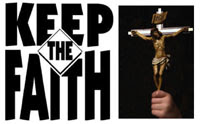 Father Raymond J. De Souza writes a piece for the National post today entitled Conscience and the
Father Raymond J. De Souza writes a piece for the National post today entitled Conscience and the
Why did the great composers lavish such attention on the Mass? For much of the period in question the great patrons of music were the ecclesiastical and the royal courts, and so Masses were commissioned for coronations and anniversaries and such. More fundamentally, there are the universal and profound themes of the Mass itself. For believing Christians, the Mass is nothing less than the story of salvation and redemption, incarnation and resurrection, made liturgically present for us now. There simply is no greater material, no greater story, to inspire the composer.
Conscience and the Mass
It’s unusual for a performance to be held in Kingston on its way to Lincoln Center, but last week we had that honour. It helped that the composer is one of our own, John Burge, director of the Queen’s School of Music. Professor Burge, fresh off winning a Juno award for his musical setting of the poem In Flanders Fields, was getting set for the American premiere of his Mass for Prisoners of Conscience, which occurred this past Sunday in New York. A few days before, with choirs from Queen’s and the University of Toronto, we had what I suppose was something of a final dress rehearsal on campus before the entire ensemble headed south.
The Latin texts for the Mass are simple: The Kyrie, Gloria, Credo, Sanctus and Agnus Dei only take about three minutes to recite. Yet the greatest composers have provided the most extraordinary settings, so much so that the history of music could not be properly told without the great Masses. Friends far more expert in music than I suggest that Bach’s Mass in B Minor is the greatest musical composition ever — equivalent to what Shakespeare did for the English language or Dante for Italian.
Why did the great composers lavish such attention on the Mass? For much of the period in question the great patrons of music were the ecclesiastical and the royal courts, and so Masses were commissioned for coronations and anniversaries and such. More fundamentally, there are the universal and profound themes of the Mass itself. For believing Christians, the Mass is nothing less than the story of salvation and redemption, incarnation and resurrection, made liturgically present for us now. There simply is no greater material, no greater story, to inspire the composer. For many composers, a Mass setting is itself an audacious venture, a way of touching the divine not dissimilar to an act of worship. Soli Deo gloria — to God alone be the glory — is how Bach would annotate his scores.
I don’t know if Professor Burge had any of that in mind, but listening to his Mass for Prisoners of Conscience in Holy Week is something like a liturgical act. The Mass sets the texts of the Kyrie, Sanctus and Agnus Dei – there is no Gloria. But in addition to the liturgical texts, Burge’s Mass includes musical settings of letters gathered by Amnesty International — the testimony of those unjustly deprived of liberty, those tortured and their families. Their suffering echoes the suffering servant of in the Book of Isaiah, of the innocent Lamb of God, of the crucified messiah.
The texts to bring to mind the Stations of the Cross, which Pope Benedict will preside over tomorrow night at the Colosseum in Rome, another site where martyrs of conscience were made. The hidden drama of the Stations of the Cross is that it is the prisoner, the condemned, the suffering, the crucified one who renders the true judgment. In the trial of Jesus, it is his accusers and judges who are actually on trial. His suffering and death is his testimony, the final confirmation that truth and love are stronger than the mere assertion of power. The contest between power and love, domination and sacrifice, is the drama of Holy Week — and the drama of the Mass.
“It is not an easy thing to torture people,” we hear during the Agnus Dei in Burge’s Mass. “For torturing requires inner participation. In this situation, I turned out to be the lucky one. For although I was humiliated, at least I did not humiliate others. I was simply bearing a profoundly unhappy humanity on my aching back. Whereas the men who humiliate you must first humiliate the notion of humanity within themselves.”
Today is Holy Thursday, the day of the Last Supper. For Catholics it is the day of the Eucharist, of the priesthood, of the Mass. In the Mass is made present the cross and on the cross is lifted up all the suffering, all the injustice, all the iniquity of all time — from the dawn of creation to the torture chambers of our own day. Every Mass setting ends with the same words of hope: dona nobis pacem. Grant us peace. So it was then; so let it be now.





No comments:
Post a Comment